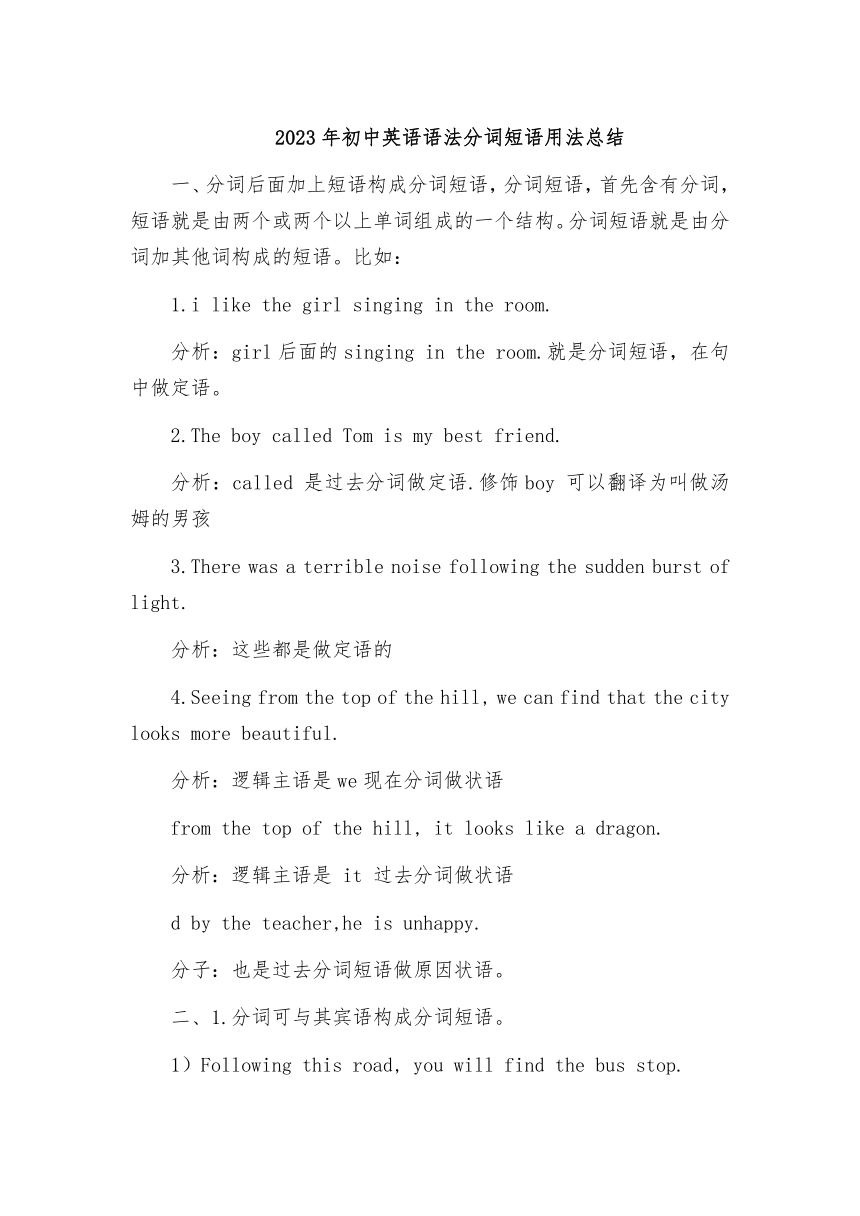
2023年初中英语语法分词短语用法总结 一、分词后面加上短语构成分词短语,分词短语,首先含有分词,短语就是由两个或两个以上单词组成的一个结构。分词短语就是由分词加其他词构成的短语。比如: 1.i like the girl singing in the room. 分析:girl后面的singing in the room.就是分词短语,在句中做定语。 2.The boy called Tom is my best friend. 分析:called 是过去分词做定语.修饰boy 可以翻译为叫做汤姆的男孩 3.There was a terrible noise following the sudden burst of light. 分析:这些都是做定语的 4.Seeing from the top of the hill, we can find that the city looks more beautiful. 分析:逻辑主语是we现在分词做状语 from the top of the hill, it looks like a dragon. 分析:逻辑主语是 it 过去分词做状语 d by the teacher,he is unhappy. 分子:也是过去分词短语做原因状语。 二、1.分词可与其宾语构成分词短语。 1)Following this road, you will find the bus stop. 要是沿着这条路走,你会找到车站。(following this road是分词短语。) 2) Do you know the girl making paper flowers 你认识做纸花的那个女孩吗?(making paper flowers是分词短语。) 2.介词及其宾语作修饰语,可与前面的分词构成分词短语。 1) Walking along the street, he saw a bar. 他在街上走时,他看到了一个酒吧。(walking along the street是分词短语。) 2) Being caught in the rain, he got a cold. 由于被雨淋了,他感冒了。(being caught in the rain是分词短语。) 3.副词作修饰语,可与前面的分词构成分词短语。 1) He came into the room laughing loudly. 他笑着走进屋子。(laughing loudly是分词短语。) 2) Walking straight along this road, you will find the bus stop. 一直沿着这条路走,你会找到车站。(Walking straight along this road是分词短语。) 4.表示某种时态或语态的分词也是分词短语。 1) Being punished, he cried. 由于被惩罚,他哭了。(Being punished是分词短语。) 2) Having graduated, he became a worker. 毕业后他当了工人。(Having graduated是分词短语。) 现在分词在句子中作状语的用法 一、分词在句子中作状语,可以表示时间、条件、原因、结果、让步、伴随等。 分词(短语)作状语时,其逻辑主语应与句中主语相一致。当现在分词表示的动作发生在谓语动词之前时, 则用现在分词的完成式;当所表示的动作与谓语的动作同时发生, 则用现在分词的一般式。完成或被动关系用过去分词。 二、现在分词作状语时,其逻辑主语应该与句子的主语一致,但有时现在分词的主语与其所在句中的主语并不一致,这种现在分词即所谓的垂悬现在分词。垂悬现在分词容易使句意模糊,甚至造成歧义,因而通常被认为是不合规范或错误的用法。 1.Searching along the deck,it had taken him some time to find a doctor. 他沿着甲板找了好久才找到一名医生。(searching的逻辑主语是句中的him) 2.Walking or sleeping,this subject was always in my mind. 不论是走路或睡觉,我总是在想着这个问题。(walking or sleeping的逻辑主语是句中的my) 3.Traveling is interesting but tiring. 旅行是有趣的,但是使人疲劳 4.The pupils will get confused if they are made to learn too much. 如果让学生学得太多,他们会感到糊涂的。 5.The argument is very convincing. 他的论点很令人信服。 6.They were very excited at the news. 听到这个消息,他们非常激动。 三、现在分词或过去分词作状语时,有时可以在分词前加while,when, once, although, until, if等连词。 1.When leaving the airport, ... ...
~~ 您好,已阅读到文档的结尾了 ~~